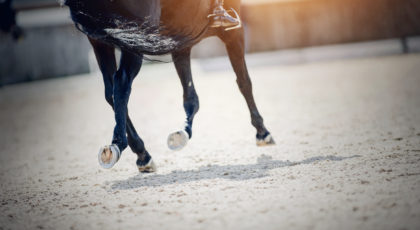I’m not sure, as a trainer, that any of us would think it’s possible to be a great trainer and not a great horseman. But there are so many different levels of what a “horseman” is.
From my point of view, I strive daily to do what is best for every single horse in my program: it is all about the horse. I am not sure everyone would agree that this is the same as being a great horseman, so this question is a hard one.
In this day and age, it is more about training the rider to be competitive at shows vs. training the rider to ride the horse the horse’s way. So, if your path as a trainer varies to include more aspects of care and this latter kind of riding, I would say your “horsemanship” level probably varies for the better too. All I can say, is, I don’t think I could train without my knowledge of every piece of what a horse needs—including the knowledge that horses can vary oh-so drastically from one another.
I feel my horsemanship skills have allowed me to be successful with many different types of horses and riders. If I didn’t have the background of starting from the bottom—mucking stalls, braiding, grooming, riding, helping the vet, and coaching—I wouldn’t be the best horseman and trainer. You can only be a horseman by practice and knowledge, so think on that!
Sitting and watching at many rings as a judge, it is so easy to see who is a real horse person at heart. When I judge, the happier horses usually win. Yes, for sure, we have times when a horse that’s been badly taken care of takes the top ribbon. But all in all, a horse that is badly taken care of will usually stop winning eventually.
As a judge, it’s easy to get a sense for the level of care a horse receives based on how it looks, but it’s also not hard to get a feeling for the rest of a rider’s horsemanship program. When I sit in the booth, I hear a lot, and I would say, for the most part, it’s difficult to put in a successful trip if your trainer isn’t a horseman! The outcome is usually less favorable, as well, for those who say things that don’t indicate good horsemanship.
From a mom’s standpoint, my happiest horses have also been my most successful horses. That doesn’t mean that it’s always easy to figure out what makes a horse “tick,” or that some of them don’t come more contented than others. I mean the two things go hand in hand: the people on the ground that understand my horses and make them happy also help them to be competitive.
As a mom, there is no way that anyone can be successful (your kid included) if the program you’re in doesn’t know how to get any and all of their horses to be happy, since these are the horses that become winners. The proof is there when previously “happy” horses go into other hands and are not so successful. My most successful long- and short-term horses have always been with people who understood them—on the ground and on their backs—and that’s being a horseman.
Dana Hart Callanan is a successful hunter, jumper, and equitation coach, an ‘R’ judge, and a sales broker. In this column, she answers common questions about A-level sport. Send your questions to news@horsenetwork.com for consideration in a future column.


 April 29, 2024
April 29, 2024 

























